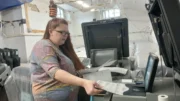By JIM MEYER
Staff writer
Oil City High School co-principal Lynda Weller told school board members Monday the district’s scores on the Pennsylvania School System Assessment tests are improving, but there is still room for growth.
Weller, who presented a data overview report at the board’s work session, said test scores dropped in 2016 because the tests changed in 2015 to align with the Pennsylvania Core Standards.
“2016 was admittedly a rough year,” Weller said. “And we still have some areas to work on.”
Board member Jim Disque asked if teachers are held accountable in areas where improvement is consistently lacking. Weller and several board members responded that teachers were also assessed under the Core Standards.
“The excuse, ‘I taught it and they just didn’t learn it,’ no longer works,” Superintendent Patrick Gavin said. “You may have taught it, but it was ineffective.”
When asked how Oil City’s scores compared to neighboring districts, Weller said the data showed Oil City was ahead of those districts.
Gavin added that Oil City was pretty much on target with the rest of the state.
“That’s comparing us to other schools of our size and resources,” he said. “You have to compare apples to apples.”
Service animal policy
In another matter Monday, board members were presented with a proposed policy regarding service animals in schools.
In a comment to the newspaper, Gavin said the district hasn’t previously had a written policy on service animals.
“It hasn’t come up yet,” he said. “I just noticed we were lacking and I figured we should get something adopted.”
The policy defines a service animal as any dog individually trained to do work or perform tasks for the benefit of an individual with a disability. The board is expected to vote on the policy next week.
Service animals must be trained to perform tasks directly related to the handler’s disability.
Under this policy, animals that are used for therapy or emotional support don’t qualify as service animals as they are not trained to perform specialized work or tasks.
Examples of work or tasks include assisting the blind with navigation, alerting people who are hearing impaired, pulling a wheelchair, retrieving items or assisting an individual during a seizure.
Under the proposed policy, prior to allowing an animal into a district building, the district will request verification of need for the animal, description of the animal’s function and training, current dog license and proof of vaccinations.
“Are we going to allow horses in here?” he asked.
“They are service animals,” Gavin replied.
Miniature horses, while far less common than dogs, have been trained as service animals for the blind.
Under the policy, a miniature horse may be used if it is specially trained, the facility can accommodate its size and weight and the horse doesn’t compromise the safe operation of the facility.










































